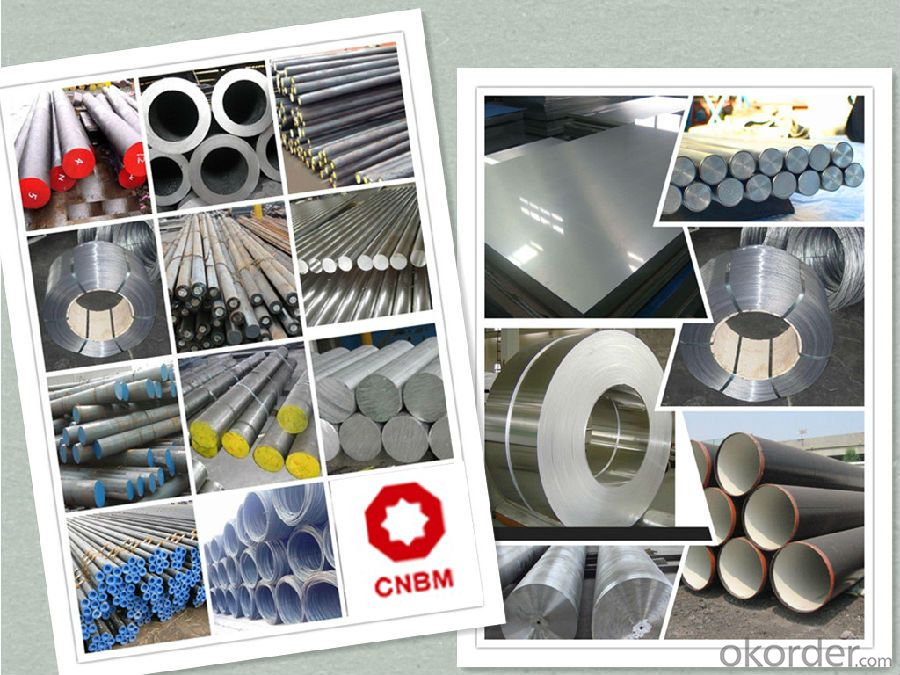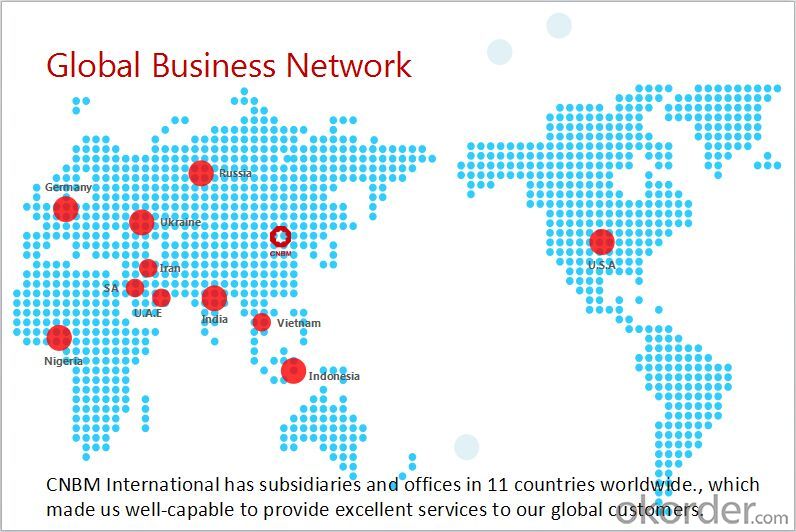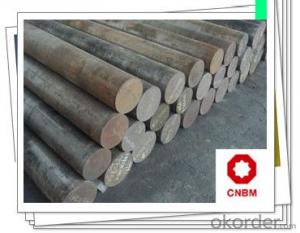Carbon Structural Steel Round Bars ASTM A36
- Loading Port:
- Shanghai
- Payment Terms:
- TT OR LC
- Min Order Qty:
- 25 m.t.
- Supply Capability:
- 120000 m.t./month
OKorder Service Pledge
OKorder Financial Service
You Might Also Like
Carbon Structural Steel Round Bars ASTM A36
PRODUCT SPECIFICATION
1, Chemical Composition %
| Grade | C | Si | Mn | S | P | Cr | Cu |
| ASTM A36 | ≤0.25 | ≤0.40 | 0.80-1.20 | ≤0.050 | ≤0.040 | ≥0.30 | ≥0.20 |
2, Diameter: 9mm - 80mm
APPLICATION
1. Manufacturing of mechanical parts
2. Welding structure building
3. Bridge engineering with higher quality requirements
PRODUCT MAIN POINTS
1, Heat Treatment: normalizing, annealing, tempering, quenching
2, Surface Treatment: black, grinding, bright, polish
3, Product Process: hot rolled, cold drawn, forged
FAQ
1, Payment Terms:
30% T/T deposit & 70% T/T before delivery.
Irrevocable L/C at sight
2, Trade Terms:
EXW, FOB, CIF, CNF
3, Delivery Time:
Normally 30-40 days. According to quantity.
4, Manufacture or Trading Company:
CNBM is a state-owned fortune global 500 trading company. We have intergrated supply system.
There are about 20 overseas locations in different countries.
PRODUCT SHOW

ABOUT US


- Q:What are the advantages of using nickel-chromium-aluminum alloy steel round bars?
- There are several advantages of using nickel-chromium-aluminum alloy steel round bars. Firstly, this alloy steel offers excellent corrosion resistance, making it ideal for applications in harsh environments or industries where corrosion is a concern. This resistance to corrosion helps extend the lifespan of the round bars, reducing maintenance and replacement costs. Secondly, nickel-chromium-aluminum alloy steel round bars have high strength and durability. This makes them suitable for applications that require heavy loads or need to withstand high temperatures. Their strength also allows for increased structural stability, making them a reliable choice for various construction projects or industrial applications. Additionally, this alloy steel has excellent thermal stability, meaning it can maintain its shape and mechanical properties even at elevated temperatures. This makes it particularly useful in industries such as aerospace, automotive, and power generation, where high temperatures are common. Moreover, nickel-chromium-aluminum alloy steel round bars exhibit good formability and machinability, allowing for easy fabrication and customization. This makes them versatile and adaptable for various manufacturing processes, enabling the production of complex shapes and designs. Lastly, this alloy steel is known for its resistance to oxidation and scaling at high temperatures. This characteristic makes it suitable for applications that involve exposure to extreme heat or rapid temperature changes, such as in furnaces or heat exchangers. In summary, the advantages of using nickel-chromium-aluminum alloy steel round bars include excellent corrosion resistance, high strength and durability, thermal stability, formability, and resistance to oxidation. These qualities make it a preferred choice for a wide range of industries, ensuring reliable performance and longevity in various applications.
- Q:How do steel round bars compare to other types of steel products?
- Steel round bars are a versatile and widely used steel product that has distinct advantages over other types. Firstly, their circular cross-section provides excellent strength and stability, making them ideal for load-bearing applications in construction, automotive, and manufacturing industries. Compared to steel plates or sheets, steel round bars offer greater customizability. They can be easily cut, drilled, and machined to meet specific requirements, allowing for complex shapes and precise dimensions. This adaptability makes them preferred in engineering and fabrication projects. In addition, steel round bars have exceptional tensile strength and durability, ensuring long-lasting performance even in demanding environments. They are highly resistant to corrosion, impact, and wear, making them suitable for outdoor or high-stress applications. Their durability also contributes to cost-effectiveness, as they require minimal maintenance and have a lengthy lifespan. Another advantage is the wide range of grades and alloys available for steel round bars. This allows for the selection of bars with specific properties, such as increased hardness, heat resistance, or enhanced machinability. The availability of various grades ensures that steel round bars can be tailored to meet specific performance requirements, making them a versatile choice for engineers and designers. In conclusion, steel round bars offer several advantages over other steel products. Their circular cross-section provides strength and stability, while their customizability allows for precise shaping. They are durable, resistant to corrosion and wear, and available in various grades, making them suitable for a variety of applications across different industries.
- Q:45# what are the main rounds for?
- High quality carbon structural steel can be used in many and many structural steels. It is widely used and can be used as long as it does not involve corrosion, or too high strength and toughness
- Q:What is hot rolling? What is called forging?
- And there is no essential difference between the rolling and forging are relying on the plastic deformation of the blank but only the blank rolling machine plates or other similar things can be put in the sheet metal forging blank is processed into a more complex shape
- Q:What is the density of a steel round bar?
- The density of a steel round bar depends on the specific type of steel being used, as there are various steel alloys with different densities. However, on average, the density of a steel round bar is usually around 7,800 kilograms per cubic meter (kg/m³).
- Q:What are the different types of steel round bar surface finishes for corrosion resistance?
- There are several different types of steel round bar surface finishes that are commonly used for corrosion resistance. These finishes provide a protective coating on the surface of the bar, preventing contact with corrosive elements and reducing the risk of rusting or degradation over time. One of the most popular finishes for corrosion resistance is hot-dip galvanizing. This involves immersing the steel round bar in a bath of molten zinc, which forms a layer of zinc coating on the surface. The zinc acts as a sacrificial anode, corroding before the steel does, and providing long-lasting protection against rust and corrosion. Another common surface finish for corrosion resistance is stainless steel. This type of steel contains a minimum of 10.5% chromium, which forms a passive oxide layer on the surface when exposed to oxygen. This layer acts as a barrier, preventing further oxidation and corrosion, making stainless steel round bars highly resistant to rust and other forms of corrosion. Electroplating is another method used to provide corrosion resistance to steel round bars. This process involves immersing the bar in an electrolyte solution and passing an electric current through it. This causes a layer of metal, such as zinc or nickel, to be deposited onto the surface of the bar, providing a protective coating. Powder coating is a popular choice for steel round bars that require both corrosion resistance and aesthetic appeal. This process involves applying a dry powder coating to the surface of the bar and then curing it under heat. The powder melts and forms a hard, durable finish that provides excellent corrosion resistance while also offering a wide range of color options. Additionally, there are specialized coatings available for specific applications, such as epoxy coatings or polymer coatings. These coatings are designed to provide superior resistance to certain corrosive environments, such as exposure to chemicals or high humidity. In summary, the different types of steel round bar surface finishes for corrosion resistance include hot-dip galvanizing, stainless steel, electroplating, powder coating, and specialized coatings. Each of these finishes offers varying levels of protection against rust and corrosion, and the choice of finish depends on factors such as the specific application, environmental conditions, and desired aesthetics.
- Q:Are steel round bars used in the construction industry?
- Yes, steel round bars are commonly used in the construction industry. They are often used as structural elements, such as reinforcement in concrete structures, as well as in the fabrication of various components and fittings.
- Q:Can steel round bars be cold worked?
- Steel round bars are capable of being cold worked. Cold working involves the plastic deformation of a metal at temperatures below its recrystallization point. This method is frequently employed to enhance the strength and hardness of steel round bars. Cold working can be accomplished through different techniques, including cold rolling, cold drawing, and cold forging. These procedures exert compressive forces on the steel, leading to shape alteration without the requirement of heating. Cold working can yield improved mechanical characteristics, heightened dimensional precision, and a more polished surface texture for steel round bars.
- Q:Can steel round bars be used in the manufacturing of cylinders?
- Yes, steel round bars can be used in the manufacturing of cylinders. Steel round bars are commonly used in various industries, including automotive, aerospace, and manufacturing, due to their high strength and durability. In the case of manufacturing cylinders, steel round bars can be a suitable material choice for constructing the cylindrical body of the cylinder. The steel round bars can be machined, forged, or rolled into the desired shape and then welded or fastened together to form the cylindrical structure. The use of steel round bars ensures a strong and sturdy construction, which is essential for the safe and efficient functioning of cylinders in various applications.
- Q:What is the average cost of steel round bars?
- The cost of steel round bars can change depending on several factors, including size, grade, and market conditions. Normally, steel round bars are priced between $0.50 and $5 per pound. Nevertheless, it is worth mentioning that these prices are only estimates and can vary depending on the specific needs and location of the purchase. Moreover, it is essential to consider additional expenses like transportation, processing, and applicable taxes to determine the total cost. To obtain the most accurate and current information on the average cost of steel round bars in your region, it is advisable to consult local suppliers or conduct market research.
1. Manufacturer Overview |
|
|---|---|
| Location | |
| Year Established | |
| Annual Output Value | |
| Main Markets | |
| Company Certifications | |
2. Manufacturer Certificates |
|
|---|---|
| a) Certification Name | |
| Range | |
| Reference | |
| Validity Period | |
3. Manufacturer Capability |
|
|---|---|
| a)Trade Capacity | |
| Nearest Port | |
| Export Percentage | |
| No.of Employees in Trade Department | |
| Language Spoken: | |
| b)Factory Information | |
| Factory Size: | |
| No. of Production Lines | |
| Contract Manufacturing | |
| Product Price Range | |
Send your message to us
Carbon Structural Steel Round Bars ASTM A36
- Loading Port:
- Shanghai
- Payment Terms:
- TT OR LC
- Min Order Qty:
- 25 m.t.
- Supply Capability:
- 120000 m.t./month
OKorder Service Pledge
OKorder Financial Service
Similar products
New products
Hot products
Related keywords


































